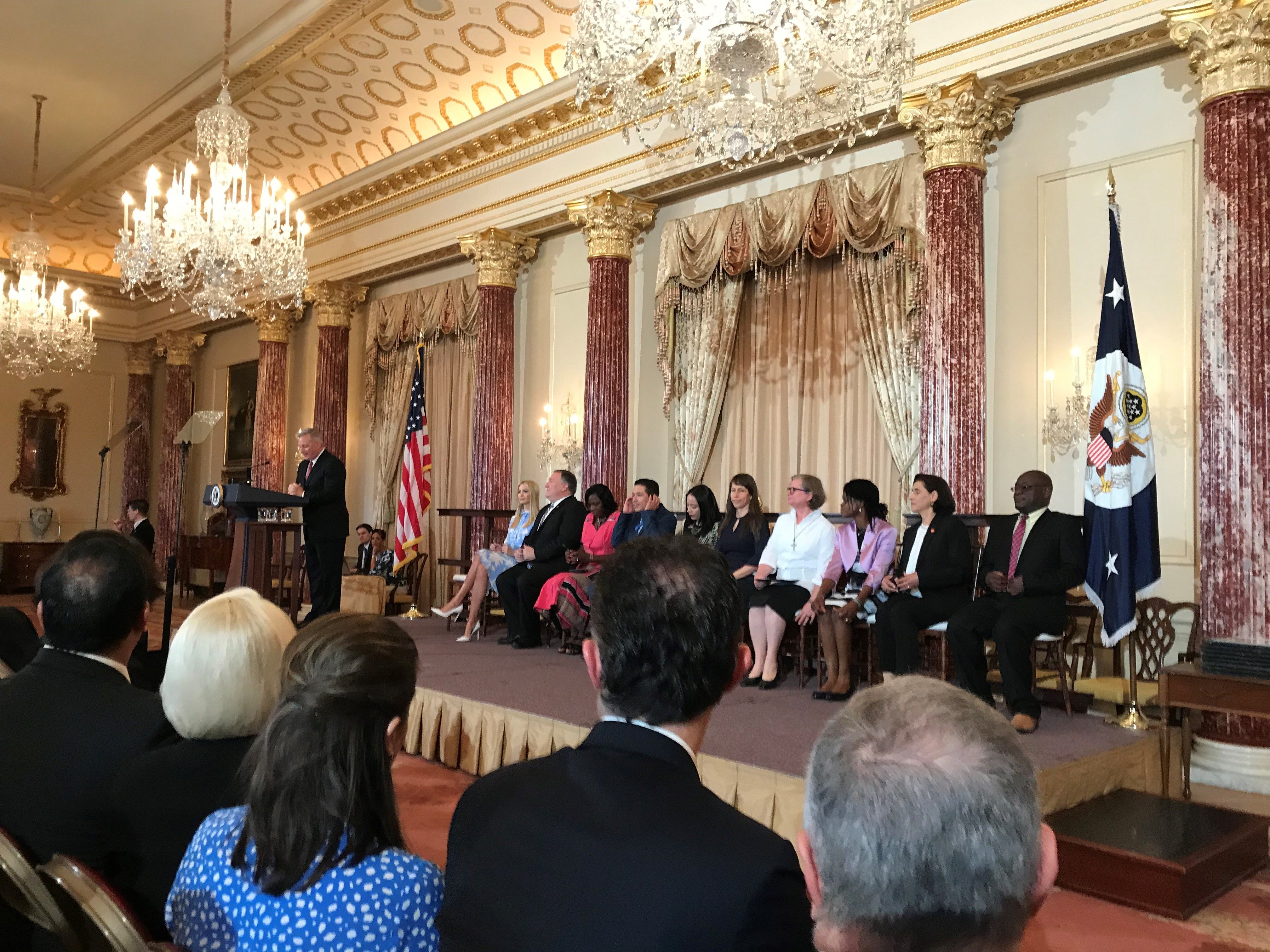By Matthew Quandt, Legal Fellow
Today, the U.S. Department of State released the 19th annual Trafficking in Persons (TIP) Report. Secretary of State Mike Pompeo, who was joined by John Cotton Richmond, the Ambassador-at-Large to Monitor and Combat Trafficking-in-Persons, and Ivanka Trump, Advisor to the President, honored 8 individuals as TIP Report Heroes in recognition for their unique contributions to fighting human trafficking worldwide.
The TIP Report is a federally-mandated annual report instituted by the Trafficking Victims Protection Act (TVPA). The report collects information from U.S. embassies, government officials, nongovernmental and international organizations, published reports, news articles, studies, and research to evaluate the efforts of 187 countries around the world in the fight against human trafficking. Shared Hope contributed to the report.
As in prior years, the Report categorizes countries into four tiers based upon their efforts to combat human trafficking (Tier 1, Tier 2, Tier 2 Watch List, and Tier 3), and mandates as a significant penalty the restriction of U.S. foreign aid funds for those countries which fall within Tier 3. In line with the TVPA’s recommendations, President Trump restricted Fiscal Year (FY) 2019 foreign aid to countries designated as Tier 3 by the 2018 TIP Report, and will likely take similar action this fall against countries designated as Tier 3 by the 2019 TIP Report. With the release of the 2019 TIP Report, Bhutan, Cuba, The Gambia, and Saudi Arabia each fell to the Tier 3 designation, while Belize, Bolivia, Gabon, and Laos saw their recent efforts rewarded with an upgrade onto the Tier 2 Watch List from their prior position on Tier 3.
Differing from past TIP Reports, which have broadly focused on transnational human trafficking and the forced movement of people from one country to another, the 2019 TIP Report intentionally focuses on trafficking that remains within the borders of a single country. The Report explains that it is always “easier to look outward and call on other governments to act; it takes much more resolution and political will for governments to look inward and stop traffickers, including their own citizens, from exploiting victims who have not crossed an international border.” The Report cites findings that “the clear majority of traffickers were citizens of the countries where they were convicted” and that “traffickers exploit 77 percent of all victims in the victims’ countries of residence,” while acknowledging that victims of sex trafficking are more likely to face transnational human trafficking than are victims of forced labor.
This focus on internal trafficking supports Shared Hope’s strategic priority on policy efforts to counter domestic minor sex trafficking within the United States since 2005. Although human trafficking is unquestionably a global issue, and Shared Hope has continued to support efforts in many countries outside of the U.S., we chose to target the trafficking of U.S. citizens and lawful permanent residents on U.S. soil in an effort to make critical policy and services changes within our own country (estimates place the number of current trafficking victims within the United States at over 400,0001). Our vision is to coordinate a national network of protection services to improve the quality of response available to sex trafficking victims while also bringing justice through criminal enforcement, deterrence of demand, and survivor involvement in the effort to end sex trafficking. Shared Hope also conducts trafficking-related research and publishes resources to aid federal and state legislators in drafting victim-centered legislation. See the Resources page for more information: https://sharedhope.org/resources/.
The United States has ranked itself as Tier 1 each year since its first inclusion in the TIP Report in 2010; receiving a Tier 1 ranking, however, “does not mean that a country has no human trafficking problem or that it is doing enough to address the problem.” While the TIP Report acknowledges the efforts made to-date by lawmakers, law enforcement, and service providers in combatting human trafficking locally, it also acknowledges there is still much work to be done. The Report urges that “officials across government should work to challenge stereotypes of a typical victim of human trafficking.” For example, the United States must continue to increase appropriate training and clarity provided to law enforcement and prosecutors in cases in which human trafficking victims are compelled by their trafficker to commit illegal offenses (“victim-offender intersectionality”). “Forced criminality takes the form of begging, prostitution, cannabis cultivation, and theft, among others. An untrained law enforcement officer or benefits adjudicator may not realize an individual is a victim of human trafficking before making an arrest or a decision on available benefits. These assumptions can also make victims more reluctant to seek help. Proactive efforts to recognize and mitigate these assumptions are therefore critical.”
Below is a summary of countries whose Tier status in the 2019 TIP Report changed from 2018. To read the entire TIP Report, visit the State Department website: https://www.state.gov/reports/2019-trafficking-in-persons-report/
Moves Up (24 countries)
From Tier 2 Watch List to Tier 2
Chad
Eswatini
Guatemala
Guinea
Haiti
Hong Kong
Kuwait
Macau
Madagascar
Mali
Mongolia
Niger
Nigeria
Senegal
Seychelles
Suriname
Tajikistan
Togo
Zimbabwe
St. Maarten* (*last year was a “Special Case” due to damage caused by Hurricane Irma)
From Tier 3 to Tier 2 Watch List
Belize
Bolivia
Gabon
Laos
Moves Down (25 countries)
From Tier 1 to Tier 2
Aruba
Denmark
Germany
Italy
Poland
Slovakia
From Tier 2 to Tier 2 Watch List
Afghanistan
Azerbaijan
Barbados
Brunei
Cambodia
Congo, Republic of the
Curaçao
Kazakhstan
Lesotho
Malawi
Marshall Islands
Romania
Sri Lanka
Tanzania
Vietnam
From Tier 2 Watch List to Tier 3
Bhutan
Cuba
The Gambia
Saudi Arabia
Sources
1 https://www.globalslaveryindex.org/2018/findings/country-studies/united-states/







